Introduction
Renting a compactor can offer numerous benefits for construction projects, from cost savings to access to the latest technology. But what exactly makes renting a compactor a strategic decision? By choosing to rent instead of purchasing, companies can avoid the hefty upfront investment and ongoing costs associated with ownership.
The flexibility of rentals allows for tailored rental durations, ensuring that you only pay for what you use. Additionally, renting provides the opportunity to test and evaluate different compactor models before making a long-term commitment. Moreover, renting offers adaptability to changing project needs and access to the latest advancements in technology.
With the construction industry constantly evolving, compactor rentals provide a way to stay at the forefront of innovation and sustainability. By understanding project needs, selecting the appropriate compactor, and prioritizing safety and maintenance, renting a compactor can streamline construction projects and maximize efficiency.
Benefits of Renting a Compactor
Choosing to rent a compactor can be a strategic decision that aligns with both financial prudence and ecological responsibility. Rentals provide the opportunity to use cutting-edge machinery without the substantial cost of ownership. This flexibility is especially advantageous when faced with diverse project demands or the need to test the efficacy of the machinery before committing to a purchase. Furthermore, leasing companies frequently offer the most up-to-date models, which can be more effective and generate reduced emissions, aligning with the increasing focus on sustainable practices in construction. The Arrowhead Landfill case illustrates the environmental advantages of modern equipment, with their rail infrastructure reducing greenhouse gas emissions by 75% compared to trucks. Similarly, architecture firm Warehome's switch to advanced 3D CAD software for sustainable design emphasizes the industry's move towards high-tech solutions that maximize efficiency and precision. With the construction sector constantly changing, the use of compacting equipment provides a means to remain at the forefront of innovation and sustainability.
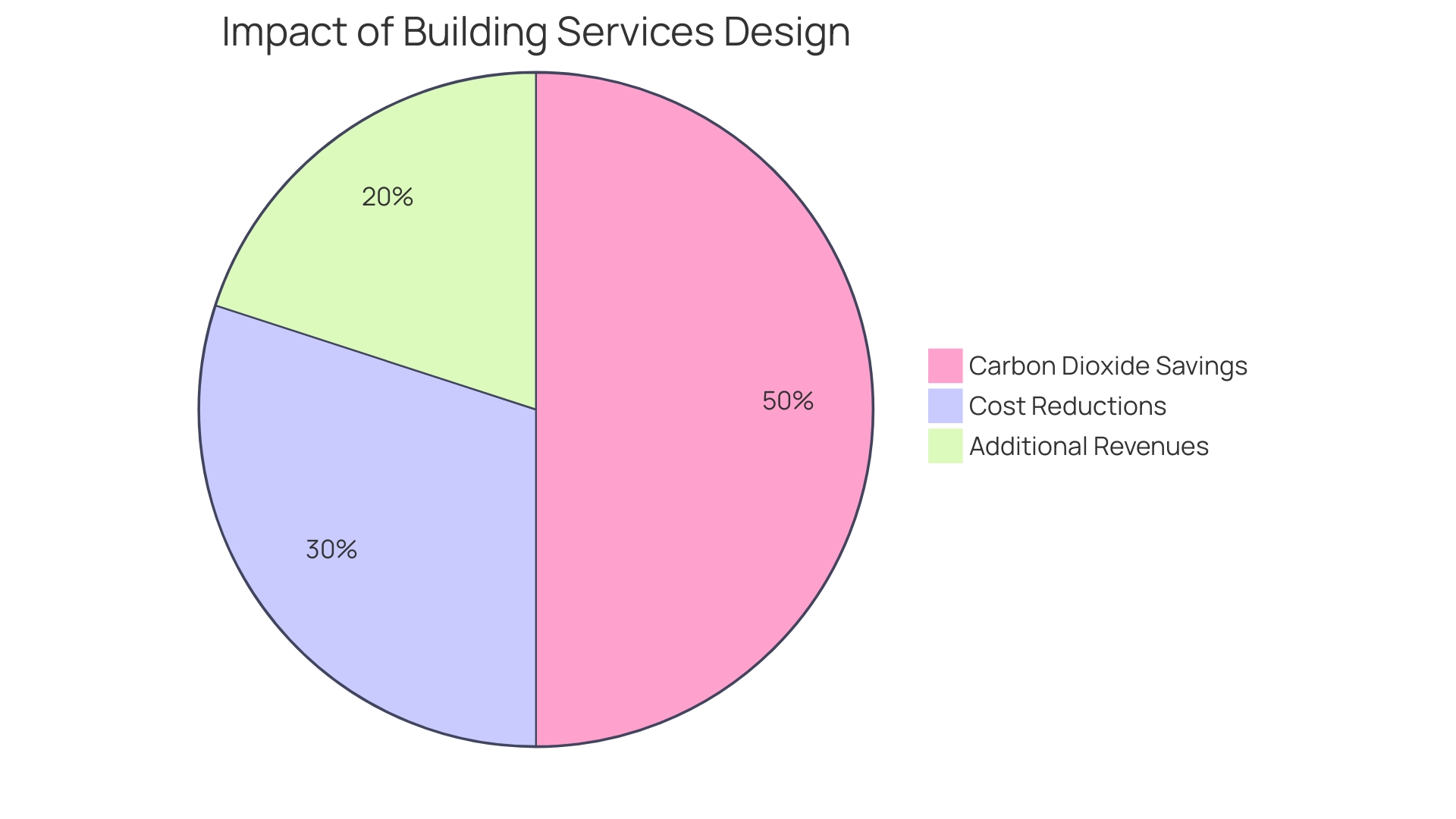
Cost Savings and Budget Efficiency
Opting to lease a compactor rather than buying one can be a tactical financial choice for construction endeavors. This decision aligns with the broader trend of prioritizing cost-efficiency in the leasing sector, which has seen a surge in recent years. By renting, companies bypass the substantial upfront investment required for purchase and eliminate ongoing costs, such as maintenance and storage. This shift towards renting allows for greater financial flexibility, enabling project managers to better manage their expenses and invest in other critical areas of their projects. The leasing model not only fills a market void for temporary resource needs but also embodies a practical approach in resource management. With organizations like the Leasing and Finance Association illustrating the vitality of the finance sector, it's evident that the flexibility of renting over buying is a cornerstone in today's economic climate. The decision mirrors the practical mindset of leading companies that focus on innovative solutions and operational efficiency.
Flexibility in Rental Duration
Flexibility is a key aspect of compactors' lease, and this couldn't be more accurate for renting compactors. Customizing the period of time to the specific requirements of your projectâbe it days, weeks, or even monthsâis not only possible but encouraged by leasing companies. This strategic method for managing machinery can greatly reduce expenses and improve effectiveness, as demonstrated by the strong expansion of the leasing industry in recent times. In practice, this means you can secure a compactor for the exact duration required, ensuring you only pay for what you use, without the burden of owning and maintaining the equipment long-term.
The trend towards renting rather than buying is evident across various industries, including construction. For example, Telerenta's initiative in Romania reflects this change, providing flexible terms for electronics and showcasing the market's potential. Similarly, Boels Rental Group's extensive network across Europe exemplifies how rental services provide practical solutions to meet consumer demands efficiently.
In the realm of heavy machinery, like compactors, the advantages are even more pronounced. Companies like URI demonstrate a business model that thrives on renting out resources, often recouping significant value from their inventory. Equipment rental is not just a stop-gap solution; it's a strategic choice that aligns with modern business practices focusing on cost-efficiency, sustainability, and adaptability to changing market conditions. By choosing to rent, you're not only making a wise financial decision but also aligning with a broader, pragmatic approach to resource management in today's fast-paced and flexible business environment.
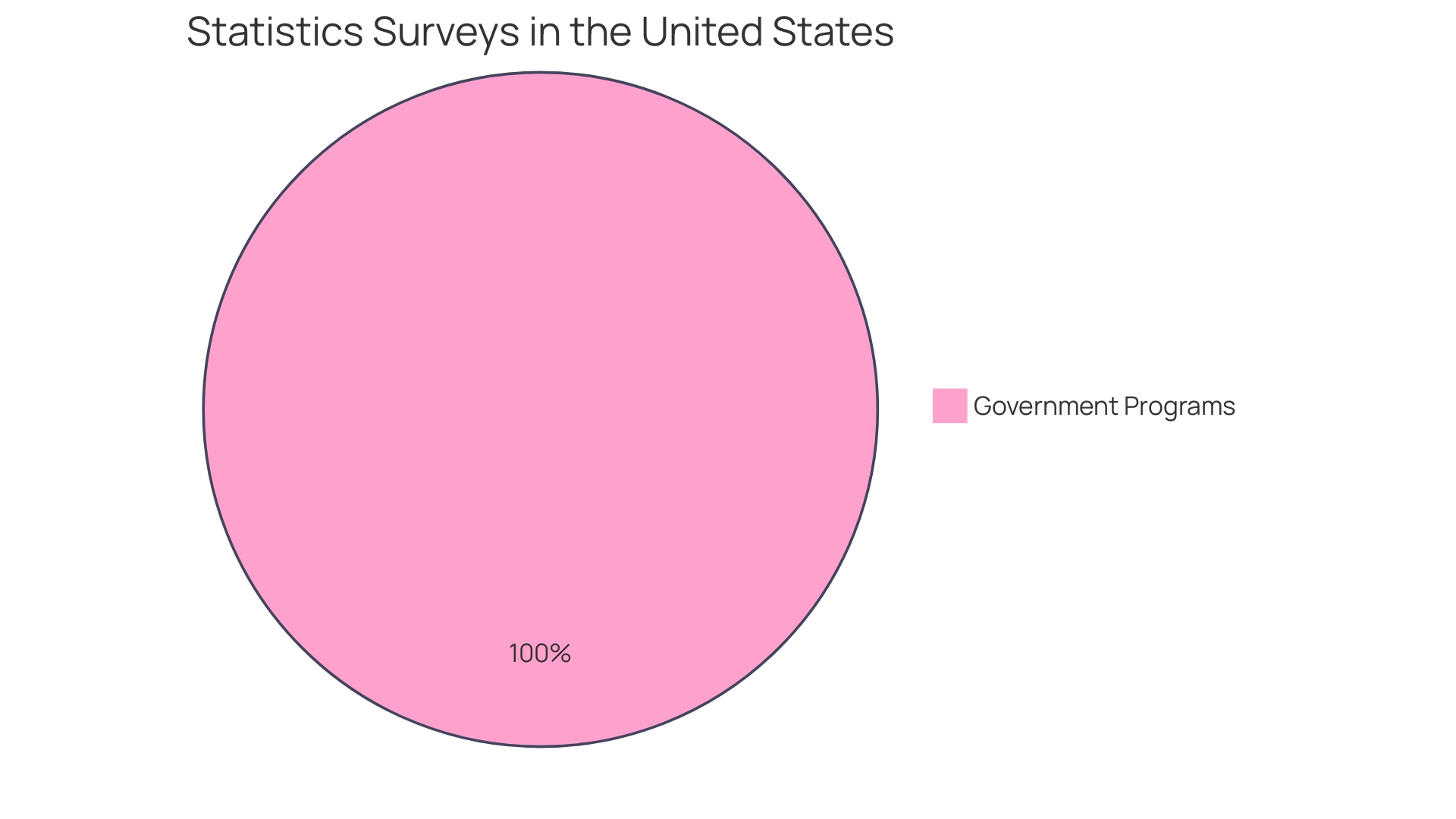
Access to Latest Technology
As the construction sector braces for cautious investments and a potential market slowdown, it's essential to seek out strategies that boost productivity without significant capital expenditure. Renting equipment is one such strategic maneuver, providing immediate access to the latest advancements in technology, thereby improving operational efficiency. Renting the most current models of compactors is essential for various construction tasks involving dirt, soil, and gravel, guaranteeing that tasks benefit from the best available tools.
The current economic landscape, as suggested by Glenigan's UK Construction Industry Forecast, predicts a growth in construction output by 15% over the next two years despite challenges. To keep pace with this expansion, embracing cutting-edge advancements such as AI-powered robotics, as demonstrated by organizations like GrayMatter and AUAR, can be reproduced within the market for renting compacting equipment. This means construction managers can leverage rentals to streamline their processes, akin to how micro-factories workâsmall, scalable, and highly efficient.
In light of the predictions by industry experts, it's clear that investing in technology and tools that drive efficiency is pivotal. While heavy-duty air compressors are noted for their versatility, equipment stands out for its specific application in preparing groundwork and foundations. By choosing to rent, companies not only manage their budgets more effectively but also circumvent the depreciation and maintenance costs associated with owning such machinery. Moreover, the ability to upgrade to newer models as technology advances without additional investment is a strategic benefit that cannot be overlooked.
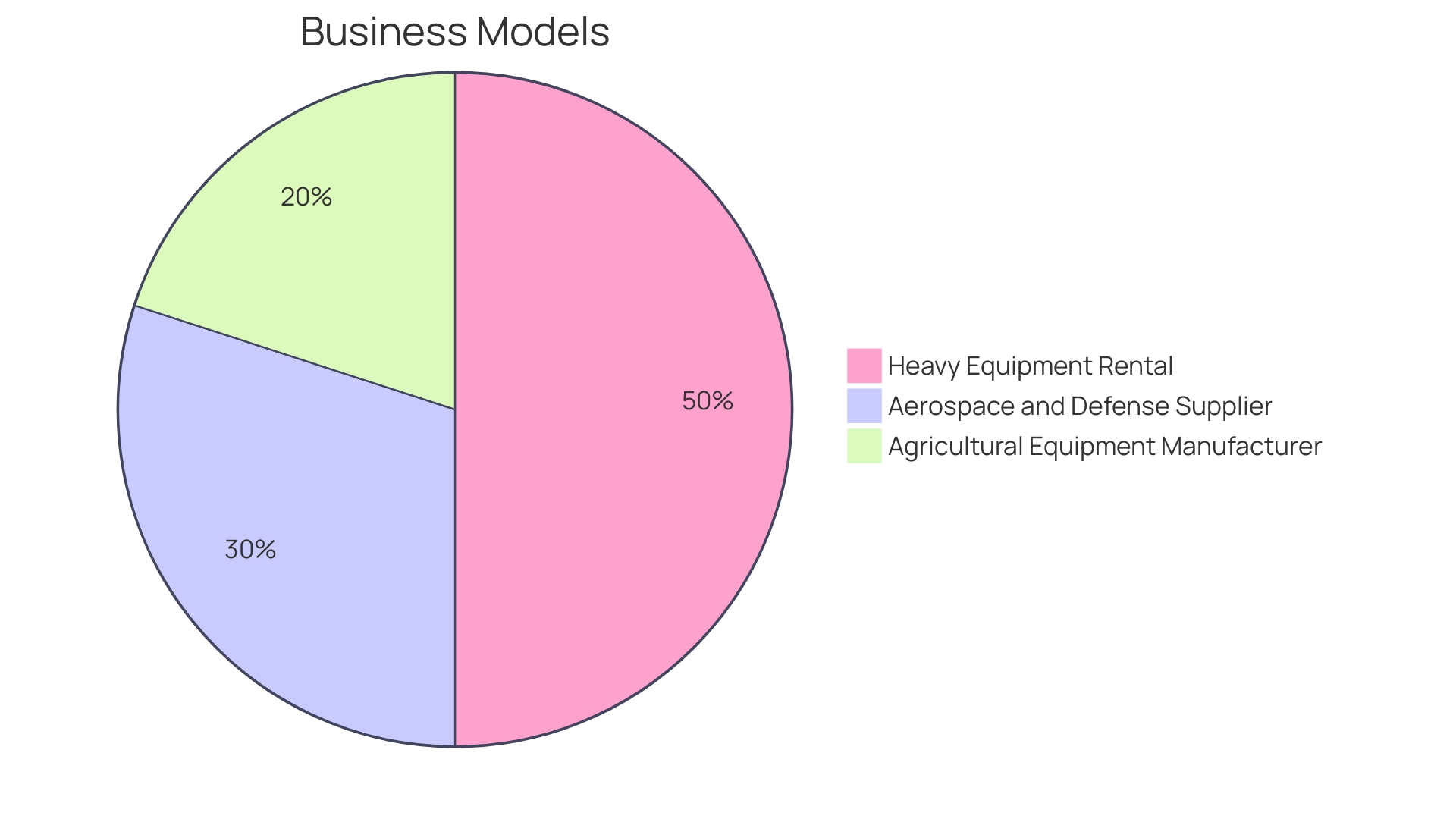
Testing and Evaluation Before Long-Term Commitment
Selecting the appropriate equipment for your project needs can be as crucial as choosing the right vehicle. Similar to the process of buying a car, where you evaluate the advantages and disadvantages of various models and brands for performance, safety, and quality, choosing a device also demands thorough deliberation. Renting a machine offers a hands-on trial that can provide valuable insights into its functionality and suitability for your specific requirements. It's a strategic move, akin to test-driving different cars to find the one that fits just right. By leasing, you acquire the versatility to evaluate different compaction machines in actual operating conditions, guaranteeing you choose the most productive and efficient machinery for your building endeavor
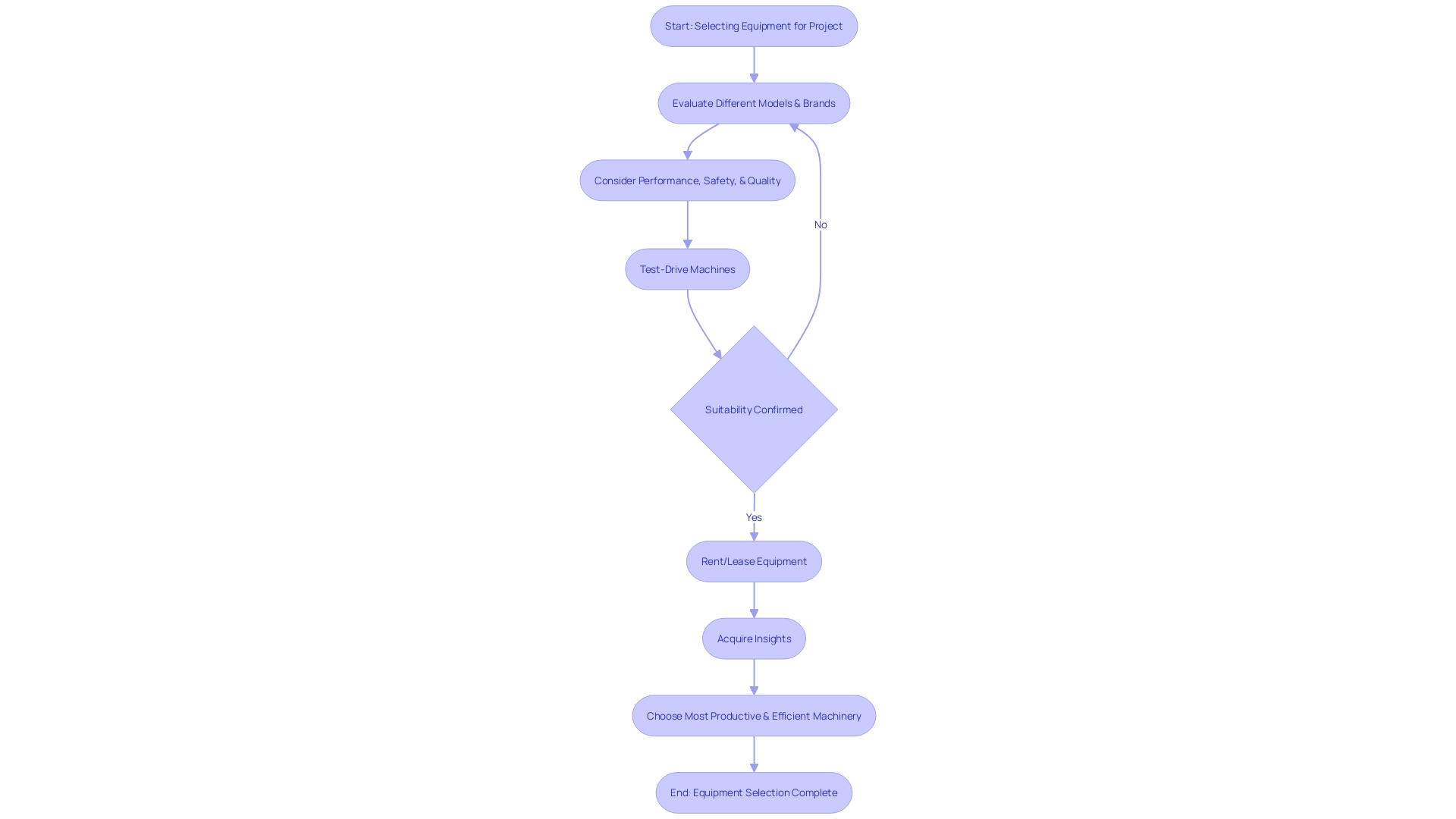
Adaptability to Changing Needs
Successfully maneuvering through the ever-changing landscape of construction endeavors demands flexibility and versatility, especially in relation to the tools utilized at the location. Choosing to rent compacting machinery is a tactical decision that provides unmatched adaptability, enabling you to promptly address unexpected demands. Should the scope of your undertaking shiftâperhaps due to design alterations or unexpected site conditionsâthe ability to switch to an alternative type or size of compactor is a boon, ensuring that endeavor momentum is maintained without significant downtime or financial penalty. Renting compactors is not just a matter of convenience; it's a cost-efficient choice that aligns with the trend of maximizing resource allocation and promoting financial prudence in the face of potential economic uncertainties. This approach is supported by recent trends in the rental market, which highlight the growing preference for renting over purchasing, particularly when the required equipment is for temporary use. Such flexibility and cost-efficiency are essential for staying competitive, especially when considering the recent findings that established companies are increasingly turning to the used market during supply chain disruptions, driving up prices and creating scarcity. By leasing, you evade the downsides of asset devaluation and the hazards connected to a volatile second-hand market, guaranteeing that your endeavors stay on course and within budget, irrespective of external market pressures.

Assessing Your Project Needs for the Right Compactor
When choosing a machine for your construction work, it's not only about completing the task, but also about doing it effectively and cost-effectively. Factors such as the project's scale, the type of material requiring compression, and the specific compression needs are crucial in selecting the appropriate compaction device. Just as the engineering sector has seen in instances like the Compressed Air Challenge, where professionals were educated about systematic approaches to improve efficiency, selecting the appropriate equipment involves a similar process of understanding and application.
For instance, soil compactors are ideal for earthmoving, while plate compactors work best for creating a level grade. It’s vital to consult with experts who can guide you through the process, much like how Bosch's solid oxide fuel cell systems are complemented by digital twins to optimize performance over time. The aim is to achieve a balance between cost-effectiveness and operational efficiency, making sure that your rental equipment offers the best value for money without compromising on quality or productivity.
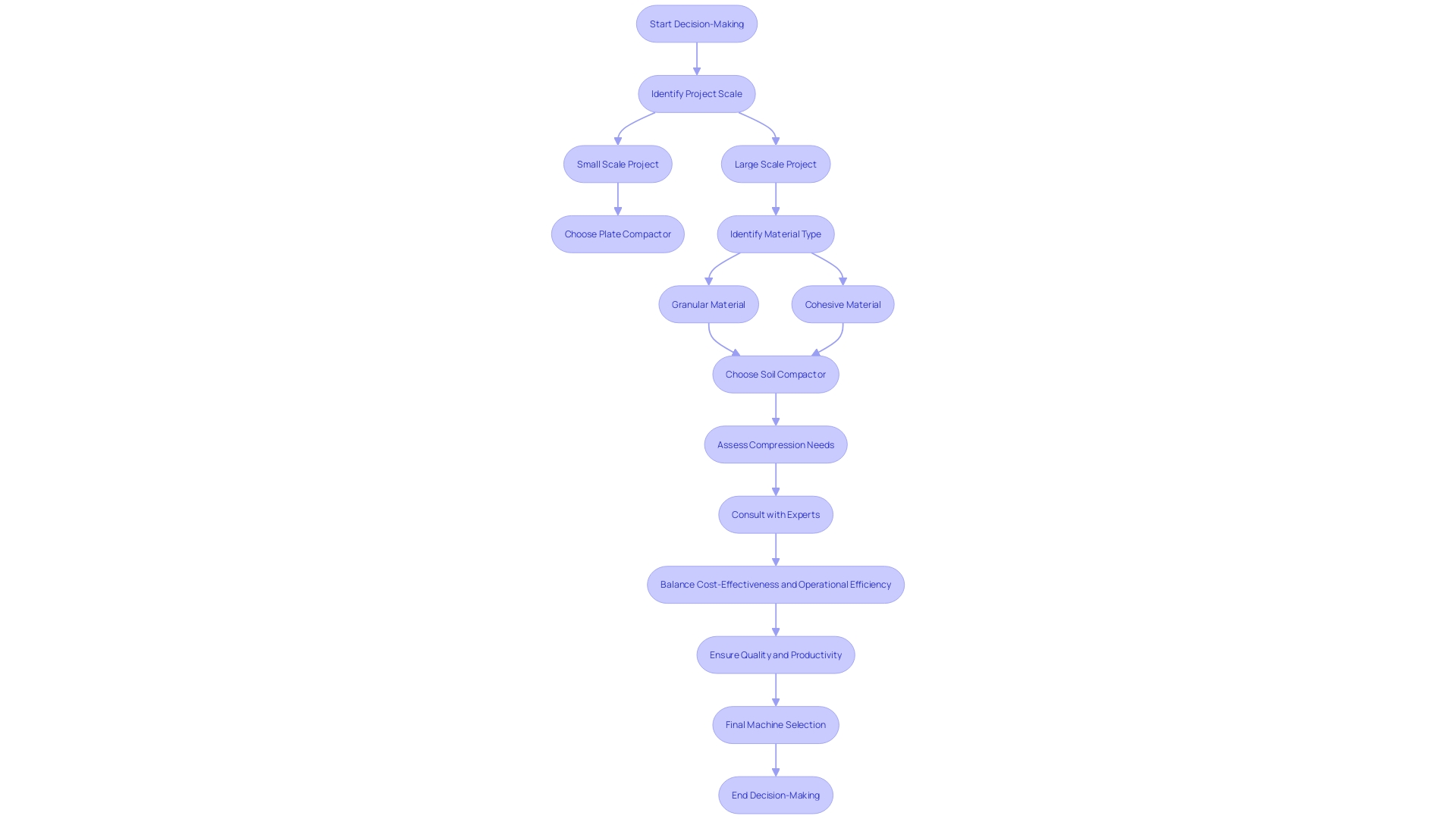
Selecting the Appropriate Plate Compactor
Choosing the appropriate equipment is vital for the triumph of any construction endeavor, and when it concerns compressing substances such as dirt, soil, and gravel, plate compactors are indispensable tools. The key to achieving a solid and stable foundation lies in selecting a plate compactor that is tailored to the needs of your undertaking. This means considering factors like plate size and compaction force, which directly impact the effectiveness of compaction, as well as maneuverability to ensure ease of use across the worksite.
For example, a construction powerhouse like Hoffmann, with its extensive experience and inclusive collaboration model, comprehends the significance of utilizing the right tools for optimal outcomes. They stress the importance of appropriate tool choice and professional advice during the entire life cycle, emphasizing the crucial role of specialized machinery in their activities.
Moreover, innovation in construction technology, such as additive manufacturing, is setting new benchmarks for efficiency and productivity. As the industry evolves, the integration of advanced techniques and tools becomes indispensable for companies looking to stay ahead. By choosing a plate machine that complies with the most recent industry norms and specific demands of the undertaking, construction supervisors can guarantee that their ventures meet the high standards of contemporary construction.
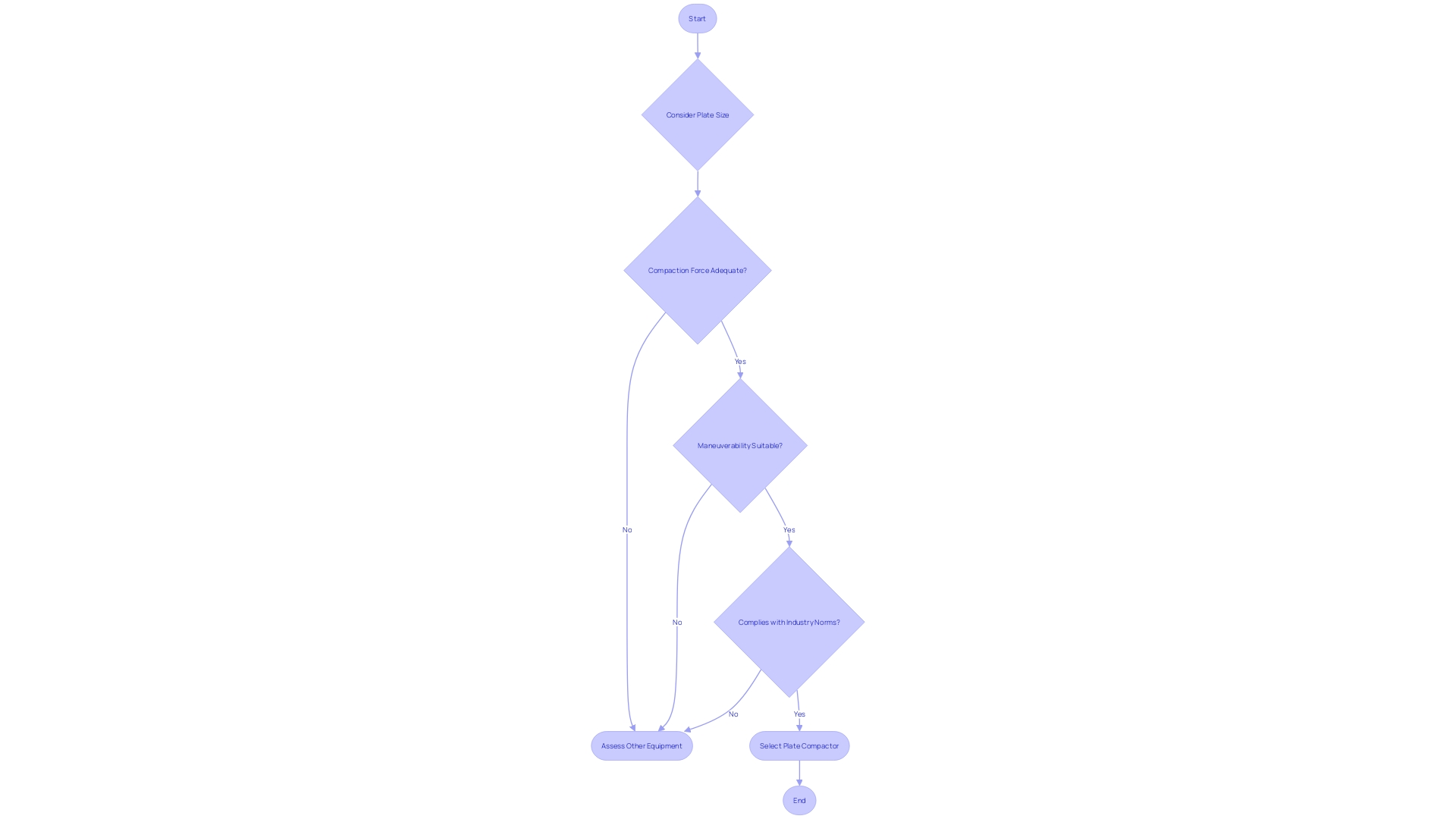
Project Size and Scope Considerations
Choosing the appropriate equipment for compacting soil, dirt, or gravel is essential to achieve optimal compaction. When dealing with smaller-scale tasks or confined spaces, a handheld or lightweight plate compactor may be your best choice, ensuring the job is done efficiently without the bulk of larger machinery. On the other hand, large-scale undertakings require sturdy and efficient compactors. These larger compactors are designed to handle significant workloads and can maintain consistent output, akin to steady traffic flow on a well-designed road, allowing for uninterrupted progress and better operational efficiency. By thoroughly assessing the size and scope of the endeavor, you can match your tools selections with the demands of the task, resulting in a successful and prompt finishing.
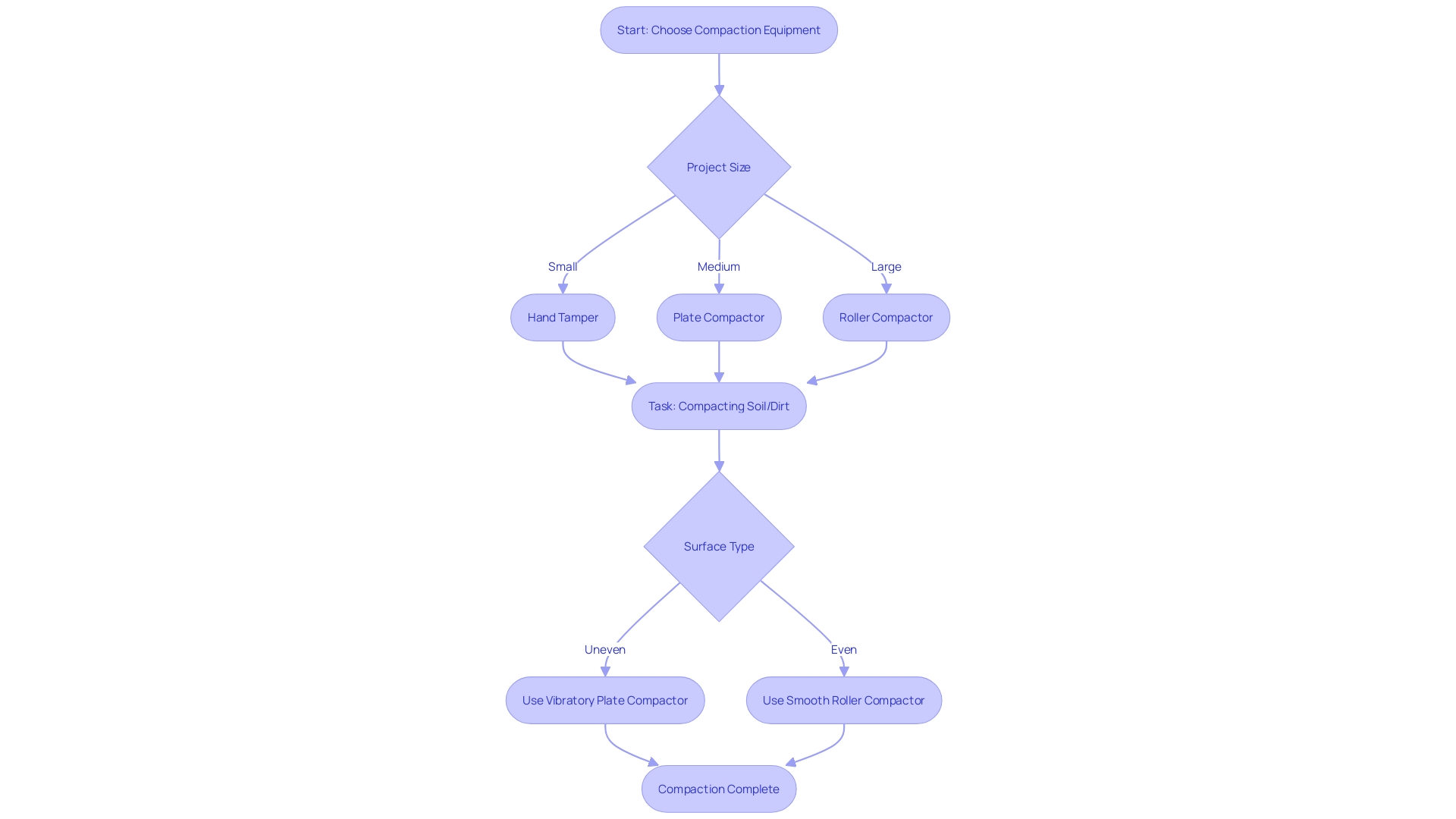
Soil Type and Desired Compaction Level
Choosing the appropriate compaction equipment is crucial in guaranteeing the strength and longevity of your construction endeavor's foundation. Different soil types, from loose gravel to dense clay, have unique characteristics that necessitate distinct compaction methods and machinery. It is essential to assess the type of soil present on your site and the level of compaction required for the project. For instance, soils with a higher density may call for compactors with greater compaction force to achieve the desired outcome. Precisely aligning the machine's capabilities with the soil type and compaction requirements is crucial to achieving optimal outcomes and guaranteeing a sturdy base for your construction projects.
Operating and Maintaining a Plate Compactor
Grasping the subtleties of compacting machinery is crucial to improving its effectiveness and prolonging its lifespan. Before using a plate machine, it's essential to learn the manufacturer's guidelines and safety procedures to ensure proper operation. A comprehensive and consistent maintenance regimen, which includes cleaning, lubrication, and inspection, can prevent potential problems and uphold the effectiveness of the device. Effective operation not only impacts the compactor's performance but also influences the overall success of construction and manufacturing endeavors where time and quality are crucial.
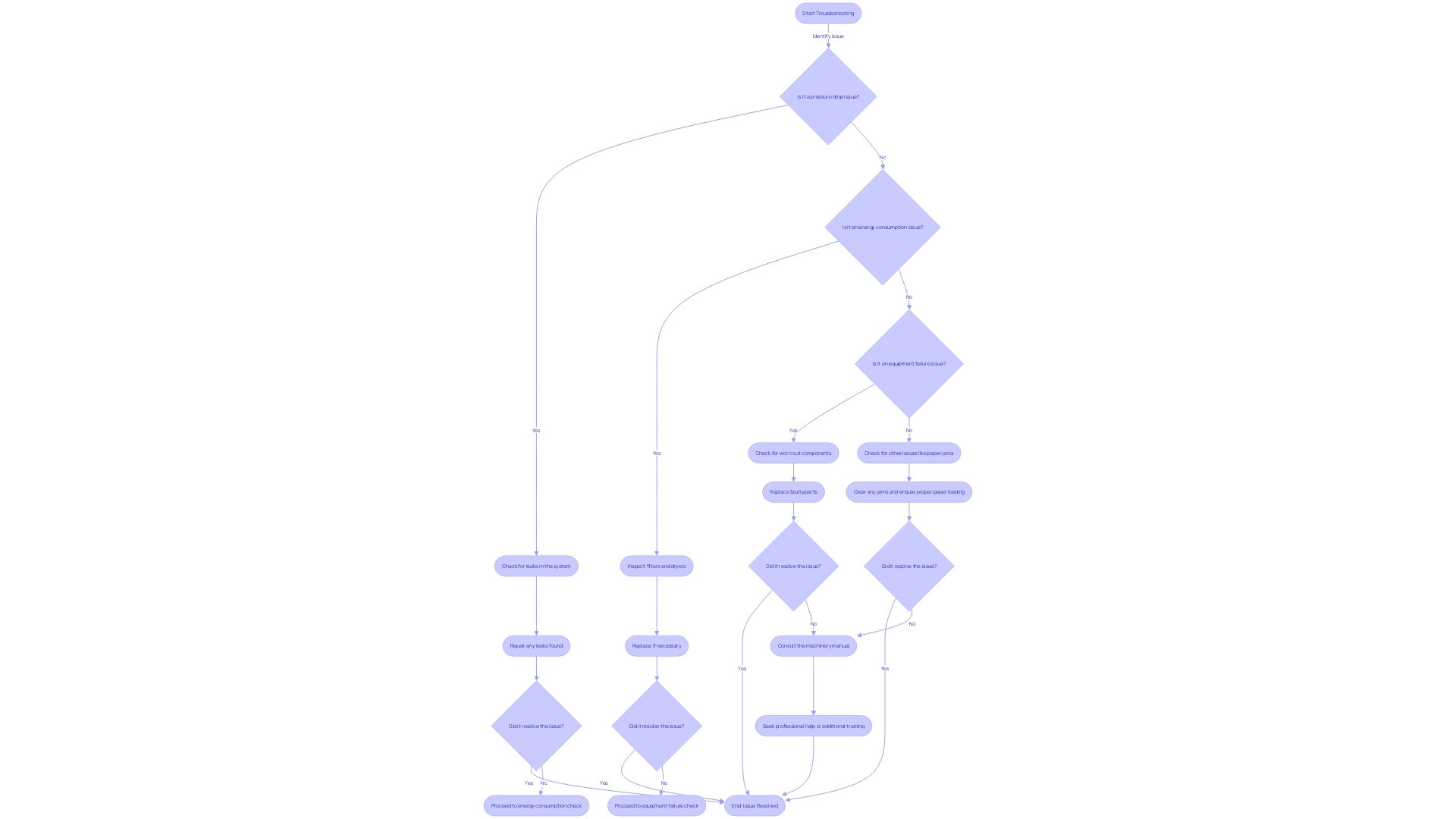
Safety Precautions and Best Practices
Prioritizing safety is essential when renting and operating compaction equipment. Mishaps with such heavy machinery can be catastrophic, so adopting rigorous safety measures is non-negotiable. It's crucial to wear the right personal protective gear, maintain stable footing, and steer clear of potential dangers during operation. A poignant example of safety oversight is an incident involving an air compressor at a metal processing plant. A VSD-controlled machine was subject to an uncharted electrical supply post-repair, posing a severe risk to service technicians. This underscores the importance of meticulous attention to safety protocols and the consequences of negligence. By following strict safety regulations, you not only protect personnel but also guarantee the smooth implementation of your construction endeavors.
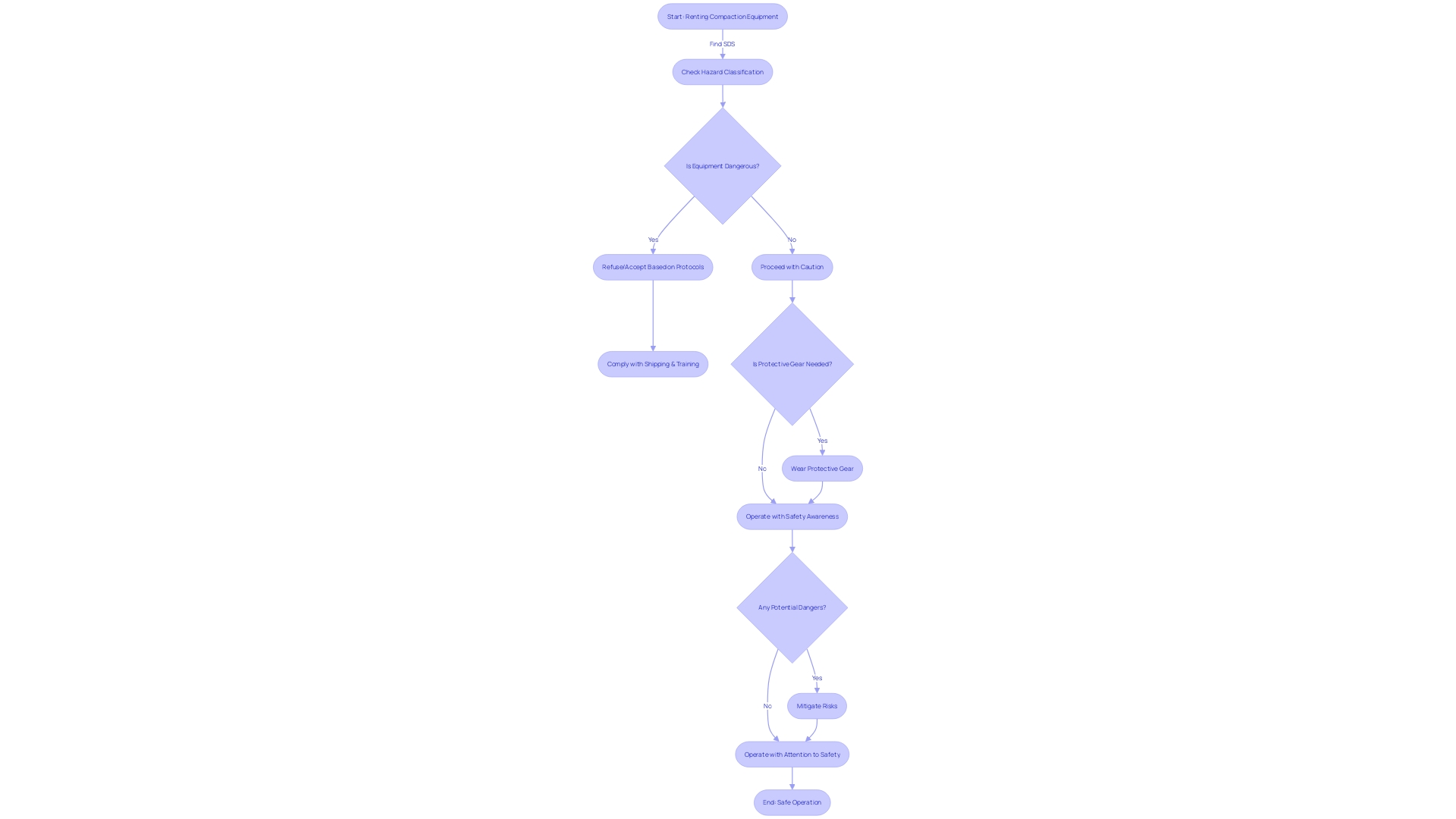
Streamlining the Rental Process with Digital Booking
With digital innovation revolutionizing how services are delivered, hiring a machine for compacting is no exception. The advent of digital booking platforms has revolutionized the landscape of tool procurement, offering a smooth and effective method to obtain the required resources for any undertaking. These platforms offer a user-friendly interface where one can easily view, compare, and reserve a variety of compactor models, ensuring you find the perfect match for your soil, dirt, or gravel compaction needs.
The rise of such platforms mirrors the success of tech solutions across various industries, from self-service kiosks improving banking and hotel experiences to comprehensive management systems that streamline corporate travel. For instance, the introduction of Telerenta's electronic leasing service showcases the market's need for adaptable, technology-oriented answers. Likewise, the construction sector gains advantages from the digitization of machinery leasing, providing project managers with the ease of reserving compactors via the internet, which is crucial for maintaining strict timetables and effectively handling finances.
These digital platforms are not just about convenience; they also represent the shift towards more sustainable and cost-effective business practices. By digitalizing the process, companies can reduce overhead costs, offering competitive pricing while expanding their reach to a global customer base. The influence of these technological progressions is apparent in various industries, indicating a future where digital platforms become the norm for hiring resources, catering to the demands of a tech-savvy generation longing for intelligent and convenient options.

Self-Service Solutions for Compactor Rentals
Self-service compactor options are transforming the way construction manages timelines and budgets. By offering the flexibility to pick up and return equipment according to your project's schedule, you bypass the inconvenience of coordinating delivery and collection times. This autonomy not only streamlines the process but also provides significant savings on labor costs, which is crucial in today's fast-paced construction environment where every minute counts. The self-service model, similar to advancements in other sectors, optimizes your operations and offers a level of convenience that traditional hiring services cannot match. As the market for renting machinery expands, incorporating self-service options becomes a crucial resource to uphold productivity and guarantee the smooth advancement of building ventures.
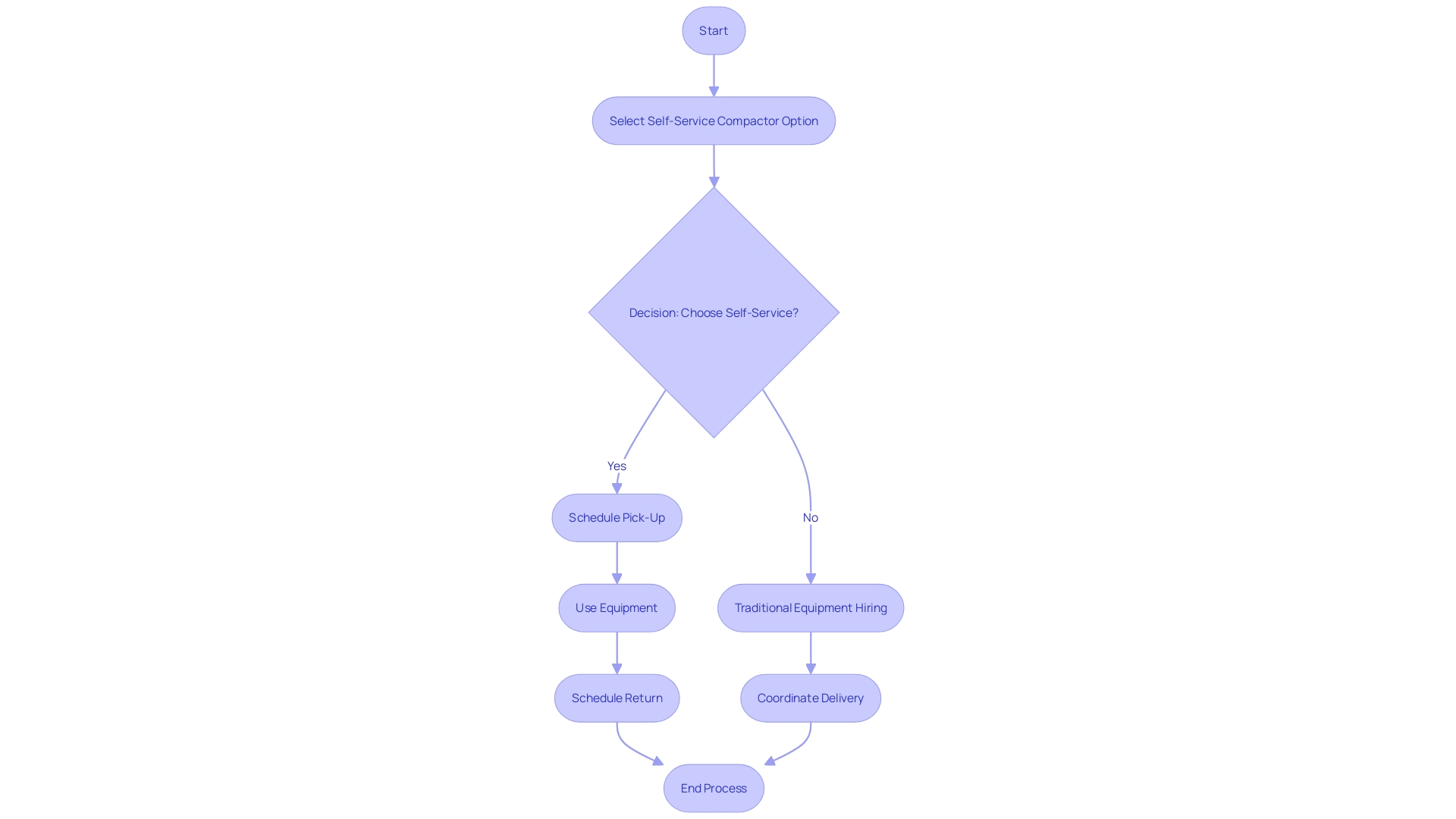
Importance of Equipment Inspection and Maintenance
When initiating a rental agreement for equipment, a thorough inspection is a key step to ensure you're receiving a machine in optimal condition. This does not only apply to functionality but also to identifying any existing wear or damage. By meticulously documenting these findings, you protect yourself from potential liability for pre-existing issues. Maintaining the compactor is equally important; regular cleaning and prompt attention to any arising problems can prevent larger malfunctions. This due diligence is crucial for maintaining the workflow and avoiding unexpected downtimes that could affect project timelines and budgets.
For example, consider the scenario where a sudden breakdown occurs. Companies like Atlas Copco Rental showcase how renting can provide the flexibility to swiftly address such emergencies without the added weight of ownership costs. Their dedication to efficiency is evidence of the importance of a solid leasing strategy. Utilizing rental tools effectively can reflect the operational excellence observed in successful businesses, such as ACE Winches, which prioritize quality service and adaptability in their operations.
Adherence to best practices in equipment management, as highlighted by industry professionals, underscores the importance of training and certification. These are not merely regulatory requirements but are integral to ensuring safety and efficiency in handling heavy machinery. Remember, an ounce of prevention is worth a pound of cure, especially when it comes to managing the tools that are vital to your project's success.
Understanding Rental Terms and Conditions
It's essential to examine the agreement terms when securing a compactor lease. Aspects such as the duration of the period, pricing, insurance provisions, and liability should be thoroughly understood to prevent unforeseen expenses or conflicts. This diligence is underscored by cases adjudicated by consumer committees, where disputes often arise from misunderstandings over vehicle conditions and financial obligations post-rental. For instance, a ruling by the Complaints Committee highlighted a situation where a vehicle's malfunction was deemed not the responsibility of the renter, who had used it only briefly before the issue arose. Moreover, with the industry of leasing, encompassing large machinery, progressingâdemonstrated by a move towards cash transactions and the expansion of major leasing companies like Boels Rental Groupâthe significance of explicit conditions becomes even more emphasized. Ensuring a comprehensive understanding of the rental contract can safeguard against disputes and align with the financial strategies advised by industry experts.
Conclusion
In conclusion, renting a compactor for construction projects offers numerous benefits. It provides financial prudence by avoiding upfront investment and ongoing costs of ownership. Rentals offer flexibility in tailored durations, adaptability to changing project needs, and the opportunity to test different models.
Access to the latest technology enhances operational efficiency. Prioritizing safety, equipment maintenance, and understanding rental terms are crucial for efficient and smooth operations.
In summary, renting a compactor is a strategic decision that offers cost savings, flexibility, access to the latest technology, and adaptability to project needs. Prioritizing safety, assessing project requirements, and understanding rental terms maximize the benefits of compactor rentals and streamline construction projects efficiently.




